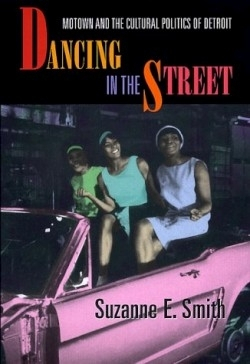Dancing in the Street
Motown and the Cultural Politics of Detroit
Motown Records is an American success story and an African American triumph. To
Smith, however, the fabled enterprise symbolizes a great deal more. The
assistant professor of history at George Mason University argues that Motown
not only took its name and talent roster from Detroit, but that it was shaped
as well by the city’s general reputation for racial tolerance and a
labor-intensive auto industry that gave rise to a black middle-class.
The drama inherent in Smith’s account is that Motown was born and came of age
just as the Civil Rights movement was gaining strength and momentum. That being
the case, Berry Gordy, the company’s founder and guiding presence until it was
sold, faced more than the usual uphill battle all small businesses confront. He
also had to walk the gossamer line between grooming his artists to appeal to a
white audience with buying power and demonstrating his solidarity with the
struggles of his own people.
Although she relies primarily on secondary sources, Smith performs a valuable
service in showing that Gordy, rather than being the rugged individualist often
depicted, was the product of a hard-working and supportive family, one that had
displayed a relentless self-help ethic for generations. She does not spare
Gordy when discussing the way he treated his artists and songwriters, providing
them a “family” atmosphere on the one hand while taking financial advantage of
them on the other. Even as he made timid forays into politics by issuing
occasional albums with civil rights themes, Gordy discouraged his artists from
taking political stands in their music.
Gordy faced his own political and ethical dilemmas against the background of a
Detroit that was rapidly changing. It manifested its own forms of racism with
community-destroying “urban renewal” programs and police brutality that led to
widespread riots. Its auto industry moved to the suburbs and displaced workers
(mostly African Americans) with automation. As Motown grew, Smith says, it
gradually lost the local character that incubated and first energized it.
To be sure, Smith is mainly concerned with the larger issues, but she does a
good job of giving behind-the-scenes glimpses of the Supremes, Marvin Gaye,
Stevie Wonder and other Motown myths. While capitalism worked very well for
Motown and its principals, Smith concludes, it was a far less effective system
in exposing and eradicating the roots of racism.
Reviewed by
Edward Morris
Disclosure: This article is not an endorsement, but a review. The publisher of this book provided free copies of the book to have their book reviewed by a professional reviewer. No fee was paid by the publisher for this review. Foreword Reviews only recommends books that we love. Foreword Magazine, Inc. is disclosing this in accordance with the Federal Trade Commission’s 16 CFR, Part 255.

